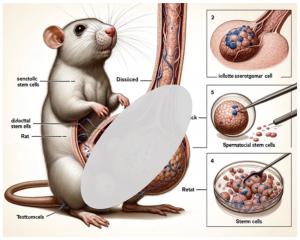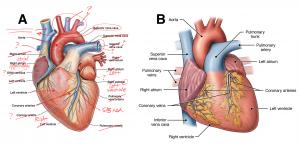Accurate Medical Illustrations and Animations are Essential Tools in Combating Health and AI Misinformation, Say Experts
As generative AI becomes more entrenched into scientific initiatives, the outcomes are likely to become increasingly worrisome and concerning.
“Certified medical illustrators aim to translate complex medical concepts into precise, clear and engaging visual narratives,” ”
CHICAGO, IL, UNITED STATES, September 18, 2025 /EINPresswire.com/ -- The proliferation of artificial intelligence, involving the generation of text and images, has led to the rise of misinformation in critical spheres, including medical and health-related visual communications. As generative AI becomes more entrenched into scientific initiatives, the outcomes are likely to become increasingly worrisome and concerning. — Stephen Mader
For instance, Frontiers in Cell and Development Biology, a peer-reviewed journal, published a paper (February 2024 – since retracted) that contained a scientifically inaccurate image of a rat with giant genitals, accompanied by labels written in garbled text, with image credits attributed to Midjourney, a popular generative AI tool (see Figure 1).
Stephen Mader, a Certified Medical Illustrator (CMI), states, “In an evolving digital world, we need to be very concerned about the impending issue of inaccurate AI-generated medical visuals that mislead the viewer.”
Furthermore, he notes that the anatomically distorted rat illustration is just one instance of inaccurate AI-generated visuals that erode public trust in health information. It is essential for health experts to emphasize the role of accurate biomedical illustrations and animations as indispensable in educating the public and health professionals alike on intricate biomedical and scientific details that advance healthcare.
“Certified medical illustrators aim to translate complex medical concepts into precise, clear and engaging visual narratives,” says Mr. Mader, President of Artery Studios, a leader in healthcare visualization. He advocates for the role of meticulously human-crafted medical illustrations and animations in fostering a clear understanding of complex matters.
In a National Library of Medicine’s article (Can artificial intelligence help for scientific illustration? Details matter. Crit Care. Jun 10, 2024), Klug and Pietsch note “…as AI generated images are usually of high graphical quality and often visually stunning, inaccuracies can creep in and be overlooked at first glance by authors and reviewers alike”. They note that “special attention is required to avoid automation bias, in which users might be prone to more readily accept a model’s output and/or distance themselves from the results, losing accountability.”
Professionally trained medical illustrators and animators can offer this special attention. These visual specialists, with advanced degrees from accredited schools that are affiliated with medical institutions, have a blend of scientific understanding and artistic skill. This allows these artist-scientists to deliver aesthetically clear, scientifically sound, and entirely accurate visual representations of health-related images to combat data-harvested algorithmic inaccuracies.
Mader states that “AI can capably replicate some esthetically pleasing artistic elements with lightening-speed efficiency, but it cannot replace scientific and instinctual judgment, a skill that trained medical illustrators bring to the table – engaging with physicians, researchers and innovators to ensure accuracy and clarity visual communications.” Inaccuracies can be significant, particularly misidentification, redundant and hallucinated labeling of anatomical structures (see Figure 2).
An increasing number of medical experts and educational professionals believe that expert medical illustrators (with a foundation in key pillars of healthcare information communications, including scientific rigor and domain expertise) should create and review visual health content, rather than relying on AI models that can distort clinical realities or hallucinate data. Visual errors may arise due to how Large Language Models (LLMs) function. The harvesting of erroneous visual examples by LLMs reinforces the adage of garbage in, garbage-out. Currie, et al (2024) remind us that " an algorithm like a generative pretrained transformer (GPT) is limited by the quality of the training data and is susceptible to reproducing and amplifying errors or biases in that training data.”
While delivering its core message regarding the increasing use of AI in visual healthcare content, the Association of Medical Illustrators (AMI) states that AI should not replace the critical scientific judgment and ethical responsibility of trained medical illustrators. Instead, AMI calls for enhancing the importance of medical illustrators in reviewing and creating visual health content, to prevent distortions or misjudgments that could compromise patient understanding and care, and to ensure the maintenance of rigorous standards for the dissemination of accurate healthcare information and communication.
About Artery Studios:
Artery Studios is a premier healthcare visualization company, specializing in creating scientifically accurate and engaging medical illustrations, animations and other media for pharmaceutical, biotech, medical device, litigation and educational organizations worldwide. Artery Studios, with its team of highly trained medical illustrators and animators, is dedicated to transforming complex scientific information into clear and impactful visual narratives.
Stephen Mader
Artery Studios
+1 800-721-1721
email us here
Visit us on social media:
LinkedIn
Facebook
Legal Disclaimer:
EIN Presswire provides this news content "as is" without warranty of any kind. We do not accept any responsibility or liability for the accuracy, content, images, videos, licenses, completeness, legality, or reliability of the information contained in this article. If you have any complaints or copyright issues related to this article, kindly contact the author above.


